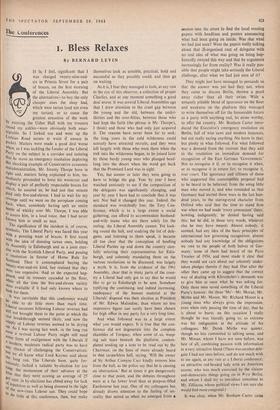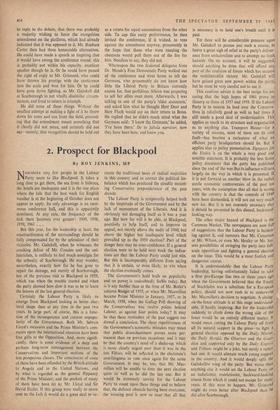The Conferences
1. Bless Relaxes
By BERNARD LEVIN IT is, I feel, significant that I was charged twenty-nine-and- six in Princes Street for a pair of braces, on the first morning of the Liberal Assembly. But the alternatives—to buy the only cheaper ones the shop had, which were tartan (and not even my tartan), or to cause the greatest sensation of the week by entering the Usher Hall with my trousers round my ankles—were obviously both unac- ceptable. So I forked out and went up the Lothian Road secure at waist if uneasy in Pocket. Matters were made a good deal worse When, as I was tackling the Leader of the Liberal Party on the subject in a corridor and insisting that he move an emergency resolution deploring this shocking example of Conservative economic maladministration, Mr. Jeremy Thorpe hove in sight and, matters being explained to him, im- Inediately proceeded to hoist his waistcoat and display a pair of perfectly respectable braces for Which, he assured us, he had just that minute Paid only five-and-eleven. I had to wait for my revenge until we were on the aeroplane coming hack, when, somebody having spilt an entire bottle of whisky over Mr. Thorpe, I was able to assure him, in a loud Voice, that I had never knOW n him to smell so nice.
The significance of the incident is, of course, sYrnbolic. The Liberal Party was faced this year With a pressing want of braces. It first toyed With the idea of donning tartan ones, holding It.s Assembly in Edinburgh and as a joint exer- cise with the Scottish Liberal Party, and passing 4 resolution in favour of Home Rule for 4Se0tIand. Then it contemplated buying the `WentY-nine-and-six kind, but realised that they %sere too expensive. And so the expected hap- Perled, and its trousers cascaded to the floor, While all the time the five-and-eleven variety Were available if it had only known where to look for them. , It was inevitable that this conference would r. able to do little more than mark time. L!beral successes following Labour reverse § had 4111 not brought them to the point at which the steal breakthrough seemed likely, and now the ,.tIPPIY of Labour reverses seemed to be drying "P. As I was saying last week, in the long run !yen a revived Labour Party might still need !cline form of realignment with the Liberals if Modern, moderate radical party was to have bItY Chance of challenging the Conservatives; th4t we all know what Lord Keynes said about t'le long run. The Liberals have, quite for- 1,111tnnslY, lacked a suitable by-election for too • rls; the momentum of their advance at the 'Tie that they were scoring an average of 25 !er Cent, in by-elections has ebbed away for lack _ tur repetition as well as being dimmed in the light f the new-risen Labour sun. They could hope ° do little at this conference, then, but make themselves look as sensible, practical, bold and successful as they possibly could, and then go on waiting.
As it is, I fear they managed to look, at any rate to the eye of this observer, a collection of proper Charlies, and at one moment something a good deal worse. It was several Liberal Assemblies ago that I drew attention to the cruel gap between the young and the old, between the under- thirties and the over-fifties, between those who had kept the faith (the phrase is Mr. Thorpe's, I think) and those who had only just acquired it. The reasons have never been far to seek; the long years in the cold wilderness could scarcely have attracted recruits, and they were left largely with those who were there when the trek into the wilderness began, to be joined later by those hardy young ones who plunged head- long into the desert when the word got back that the Promised Land was in sight.
Yes, but sooner or later they were going to have to bridge the gap. Year by year I have watched anxiously to see if the composition of the delegates was significantly changing, and year by year I have had to conclude that it was not. Nor had it changed this year. Indeed, the standard was wretchedly low; the Tory Con- ference, which is to a large extent a social gathering, can afford to accommodate husband- and-wife teams who are there solely for the outing; the Liberal Assembly cannot. Yet look- ing round the hall, and studying the list of dele- gates, and listening to them speak, it became all too clear that the conception of bustling Liberal Parties up and down the country care- fully selecting their representatives for Edin- burgh, and solemnly mandating them on the various resolutions to be discussed, was largely a myth. It is, from the evidence of the 1961 Assembly, clear that in many parts of the coun- try a Liberal had only got to say that he would like to go to Edinburgh to be sent. Somehow typifying the continuing, and indeed increasing, inadequacy of the human material at the Liberals' disposal was their election as President of Mr. Edwin Malindine, than whom no less impressive figure can surely have been chosen for high office in any party for a very long time.
And what followed was to a large extent what you would expect. It is true that the con- ference did not degenerate into the complete shambles of Torquay, when some of .us, weep- ing salt tears beneath the platform, contem- plated sending up a note to be read out by the Chairman, on the lines of many already heard in that carparkless hall, saying, Will the owner of Sir Arthur Comyns Carr kindly remove him from the hall, as the police say that he is causing an obstruction.' But at times it got dangerously close to that point, and the debates throughout were at a far lower level than at purpose-filled Eastbourne last year. One of my colleagues has already drawn attention to the feeling of un- reality that seized us when we emerged from a session into the street to find the local evening papers with headlines and posters announcing what had been going on inside. Was that what we had just seen? Were the papers really talking about that ill-organised rout of delegates with no real idea of what was going on being hap- hazardly swayed this way and that by arguments increasingly far from reality? Was it really pos- sible that people might take seriously the Liberal challenge, after what we had just seen of it?
They might just have managed to persuade us that the answer was yes had they not, when they came to discuss Berlin, thrown a pearl away richer than all their swine. With a uniquely pitiable blend of ignorance on the floor and weakness on the platform they managed to write themselves off for the foreseeable future as a party with anything real, let alone worthy, to offer the country. Mr. Bonham Carter intro- duced the Executive's emergency resolution on Berlin, full of wise saws and modern instances, but not really saying anything. No harm in that; but plenty in what followed. For what followed was a demand•from the rostrum that they add to the resolution an immediate demand for recognition of the East German 'Government.' Not to recognise it if, or to recognise it when, or to recognise it in return for; to recognise it, tout court. The ignorance and silliness of those who supported this contemptible proposal had to be heard to be believed; from the smug little man who moved it, and who reminded us that Germany had started three wars in the last hun- dred years, to the staring-eyed character from Oxford who said that the time to stand firm was when we had made 'every concession' (later, howling indignantly, he denied having said this; but he did, in those very words, whatever else he may have meant). Almost nobody, it seemed, had any idea of the basic principles of international law governing recognition; almost nobody had any knowledge of the obligations we owe to the people of both halves of Ger- many; none of them had heard of the Paris Treaties of 1954, and most made it clear that they would not care about out solemnly under- taken pledges therein if they had. One after the other they came up to suggest that the correct way of dealing with Khrushchev's demands was to give him at once what he was asking for. Only three men saved something of the Liberal Party's honour; the three `Ms'—Mr. Moran, Mr. Mirfin and Mr. Moore. Mr. Richard Moore is a young man who always gives the impression, even when only passing the time of day, that he is about to burst; on this occasion I really thought he was literally going to, so extreme was his indignation at the attitude of his colleagues. Mr. Derek Mirfin was quieter, though no less committed to talking sense, and Mr. Moran, whom I have not seen before, was best of all, combining passion with information in a very attractive blend.(There was another dele- gate I had not seen before, and do not much wish to see again, at any rate at a Liberal conference; an attractive red-headed lady with an American accent, who was much exercised by the sinister anti-democratic things going on in West Berlin, and whom I shall try to introduce sometime to Mr. Zilliacus, whose political views I am sure she would find most congenial.) It was clear, when Mr. Bonham Carter came to reply to the debate, that there was probably a majority wishing to force the recognition amendment on the platform, which had already indicated that it was opposed to it. Mr. Bonham Carter then had three honourable alternatives. He could have made a speech so inspiring that it would have swung the conference round; this is probably not within his capacity, excellent speaker though he is. Or he could have passed the right of reply to Mr. Grimond, who could have thrown his prestige with the conference into the scale and won for him. Or be could have gone down fighting, as Mr. Gaitskell did at Scarborough in not wholly dissimilar circum- stances, and lived to return in triumph.
He did none of these things. Without the smallest attempt at making a fight of it he threw down his arms and ran from the field, pretend- ing that the amendment meant something that it Clearly did not mean, and certainly did not say—namely, that recognition should be held out as a return for equal concessions from the other side. To cap this sorry performance, he then invited the conference, if it wished, to vote against the amendment anyway, presumably in the hope that those who were roasting the chestnuts would pull them out of the fire for him. Needless to say, they did not.
Whereupon the two fraternal delegates from Dr. Mende's Free Democratic Party walked out of the conference and went home to tell the Germans, who presumably do not know how little the Liberal Party in Britain currently counts for, that perfidious Albion was preparing to sell her allies once more. Afterwards, I was talking to one of the party's 'elder statesmen,' and asked him what he thought Herr Durr and Herr Flach would say on their return to Bonn. He replied that he didn't much mind what the Germans said: 'I know the Germans,' he added, 'I've been there.' De te tabula narrator; now they have been here, and know you.







































 Previous page
Previous page